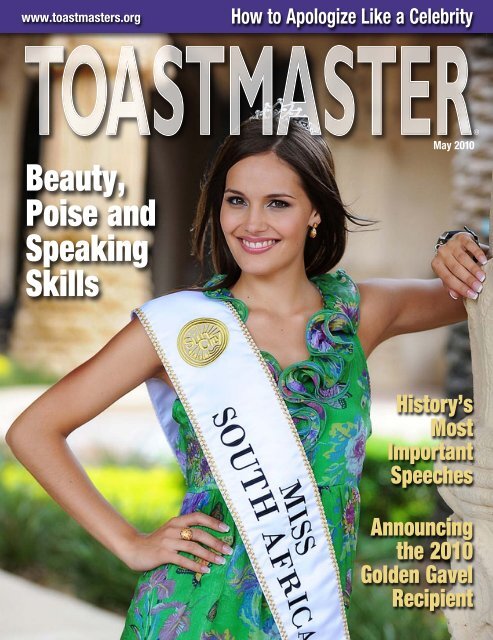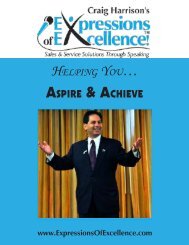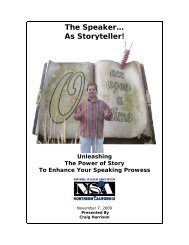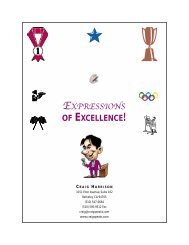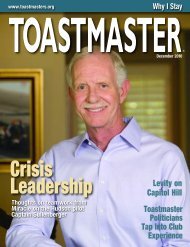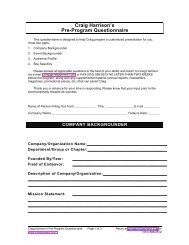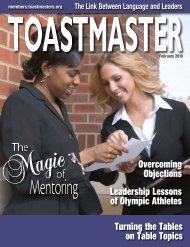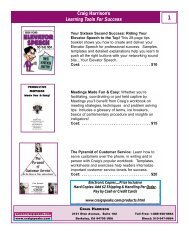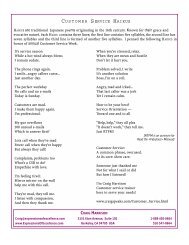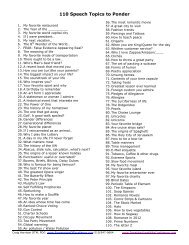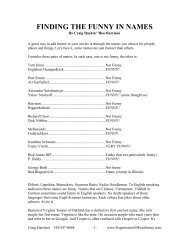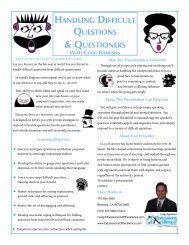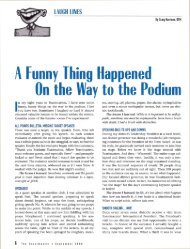toastmasters - Craig Harrison's Expressions of Excellence
toastmasters - Craig Harrison's Expressions of Excellence
toastmasters - Craig Harrison's Expressions of Excellence
Create successful ePaper yourself
Turn your PDF publications into a flip-book with our unique Google optimized e-Paper software.
www.<strong>toastmasters</strong>.org How to Apologize Like a Celebrity<br />
Beauty,<br />
Poise and<br />
Speaking<br />
Skills<br />
®<br />
May 2010<br />
History’s<br />
Most<br />
Important<br />
Speeches<br />
Announcing<br />
the 2010<br />
Golden Gavel<br />
Recipient
LOOKING AT LANGUAGE<br />
14 TOASTMASTER May 2010<br />
By <strong>Craig</strong> Harrison, DTM<br />
Avoid Clichés Like the Plague<br />
The judicious use <strong>of</strong> clichés,<br />
those stereotypical expressions<br />
we hear so <strong>of</strong>ten, can be<br />
effective, both in speech and in<br />
print. When used appropriately,<br />
clichés are a form <strong>of</strong> shorthand that<br />
can get listeners to nod knowingly<br />
while furthering the intended course<br />
<strong>of</strong> action. Yet excessive reliance on<br />
clichés can be fatal to speeches and<br />
stories, and should be avoided<br />
whenever possible.<br />
A cliché, by definition, is a trite,<br />
commonplace expression – a sentence<br />
or phrase usually conveying<br />
a popular or common thought or<br />
idea. But the very fact that it has<br />
become a cliché, through popular<br />
use – and overuse – suggests that<br />
the phrase has lost originality and<br />
ingenuity and, thus, impact.<br />
Using a cliché is like taking a<br />
familiar shortcut. At times, it can<br />
reassure listeners or allow you to<br />
express yourself without thinking<br />
too much. Yet it shows a lack <strong>of</strong><br />
imagination and robs the language<br />
<strong>of</strong> interesting word combinations<br />
and fresh descriptions. The danger<br />
is that this path will lead you to<br />
stale thinking. My advice: Avoid<br />
clichés ... like the plague!<br />
Day-To-Day Clichés<br />
Every culture and language has its<br />
clichés. Many embody universal<br />
truths. Some come from farming,<br />
sports, business or the political<br />
arena. Others come from the<br />
influences <strong>of</strong> foreign cultures.<br />
Consider the following:<br />
No use crying over spilled milk<br />
Old as dirt<br />
I wasn’t born yesterday<br />
What goes around comes around<br />
Yada, yada, yada<br />
Moving forward<br />
At the end <strong>of</strong> the day<br />
It’s déjà vu all over again<br />
It’s like putting lipstick on a pig<br />
When all is said and done<br />
Laughing all the way to the bank<br />
It’s now or never<br />
Tried and true<br />
It’s a slam dunk<br />
No man left behind<br />
That goes without saying<br />
Talk is cheap<br />
Where there’s smoke, there’s fire<br />
If I Had a Nickel …<br />
By attending Toastmasters meetings<br />
regularly, you’re likely<br />
exposed to a separate set <strong>of</strong><br />
clichés. Examples:<br />
Without further ado<br />
Put your hands together for<br />
This speaker needs no<br />
introduction<br />
And so on and so forth<br />
Think outside the box<br />
In the final analysis<br />
In conclusion<br />
To which I respond:<br />
Get Thee to a Thesaurus<br />
Don’t be lazy. Replace these over -<br />
used phrases. A good first step is<br />
consulting a thesaurus for appropriate<br />
alter natives. Seek precision<br />
in your speeches and stories.<br />
Focus on specificity in your<br />
Eschew hackneyed phrases in<br />
favor <strong>of</strong> inventive expression.<br />
descriptions. Your readers and listeners<br />
will appreciate it.<br />
Opening Salvos<br />
Perhaps the most common cliché<br />
heard in Toastmasters is the speech<br />
opener “Mr./Madam Toastmaster,<br />
fellow Toastmasters and most welcome<br />
guests.” Yet have you ever<br />
noticed that none <strong>of</strong> the contestants<br />
in the World Championship <strong>of</strong><br />
Public Speaking starts his or her<br />
speech this way? It’s not that they<br />
don’t use this line, and they clearly<br />
mean no disrespect to the audience<br />
and judges, but they avoid muddling<br />
up their speech opening with<br />
a sentence so common and bland.<br />
Why would they?<br />
While some would argue the<br />
merits <strong>of</strong> beginning each speech<br />
with the customary “Mr./Madam<br />
Toastmaster, fellow Toastmasters<br />
and most welcome guests,” I<br />
believe strongly that each speech<br />
should begin not with a cliché<br />
(especially one that only applies to<br />
Toastmasters audiences) but with a<br />
unique statement, exclamation or<br />
question specific to that speech.<br />
You can easily follow up, after your<br />
speech’s first sentence, or its first<br />
paragraph, with some sort <strong>of</strong> greeting.<br />
Don’t miss the opportunity to<br />
open your speech powerfully with a<br />
tailor-made statement.<br />
Can You Do the Twist?<br />
Let’s face it: Clichés are common. In<br />
place <strong>of</strong> clichés, be creative in your<br />
writing and speaking. Be inventive.<br />
Eschew the mundane.
Among the great joys <strong>of</strong> the<br />
English language are the creative<br />
ways in which sentences can be<br />
fashioned. Take pride in mixing and<br />
matching words to create new,<br />
evocative combinations that enrich<br />
your stories, speeches and essays.<br />
If nothing else, modify the cliché.<br />
For example, at a recent meeting<br />
<strong>of</strong> the LaughLovers club in Oakland,<br />
California, I began my speech with<br />
the salutation “Good evening, ladies<br />
and Laughlovers!” Because it was a<br />
twist on a standard cliché (ladies<br />
and gentlemen), it garnered a laugh.<br />
You, too, can surprise and delight<br />
your audiences by employing twists<br />
to common clichés and create fresh<br />
word sequences that are simultaneously<br />
familiar and different.<br />
Cliché Bingo<br />
Bring this Cliché Bingo sheet to<br />
your next club meeting. See how<br />
many <strong>of</strong> these clichés you hear during<br />
the meeting – but don’t yell “Bingo!”<br />
aloud. For advanced credit, expand<br />
this table to 4” x 4” or 5” x 5.” T<br />
Mr./Madam<br />
Toastmaster, fellow<br />
Toastmasters & most<br />
welcome guests<br />
Without further ado<br />
And so on<br />
and so forth<br />
Put your hands<br />
together for<br />
TOASTMASTERS<br />
INTERNATIONAL ®<br />
In the<br />
final analysis<br />
6 Download a blank Cliché Bingo<br />
chart at: http://tinyurl.com/yjxdr8j<br />
This speaker needs<br />
no introduction<br />
Think outside<br />
the box<br />
And in conclusion<br />
<strong>Craig</strong> Harrison, DTM, <strong>of</strong> Berkeley, California, is a member <strong>of</strong> several Toast -<br />
masters clubs. He is a pr<strong>of</strong>essional speaker and founder <strong>of</strong> <strong>Expressions</strong> <strong>of</strong><br />
<strong>Excellence</strong>. Contact him via www.<strong>Expressions</strong>Of<strong>Excellence</strong>.com.<br />
May 2010 TOASTMASTER 15


